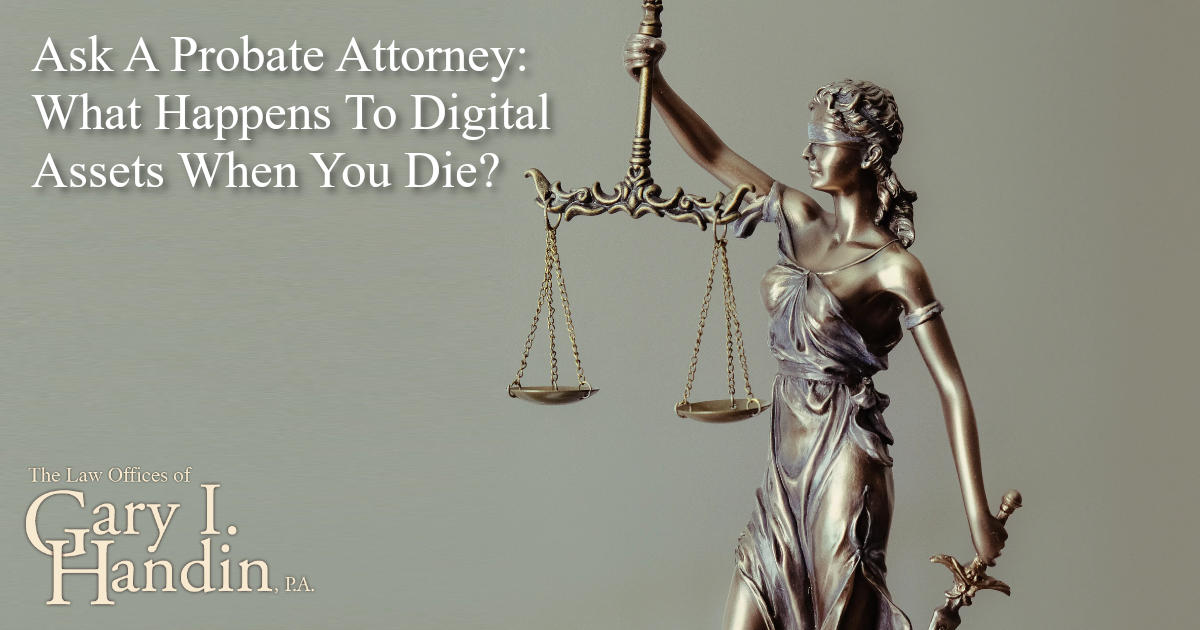
When you think of assets and estate, your mind most likely first considers property and equipment. But what about digital assets?
Digital assets can be significantly valuable, and their accessibility is often needed after your passing. An experienced probate attorney will help you decide how to distribute these digital assets.
Items such as online accounts, domain names, blogs, cloud storage, and intellectual property are all considered digital assets. Any asset in digital format that comes with the right to use is considered a digital asset. But are they subject to probate after death?
Understanding Probate
There are two aspects of life that are guaranteed – that we live, and that we die. The processes and details of these two certainties are less simple and can even be complicated at times.
The court-supervised probate process involves the administration of a deceased person’s estate and distributing these assets to beneficiaries. All wills are required to go through this legal process, with the inclusion of a probate attorney being present.
Through the probate process, heirs are established, debts are paid, and assets are distributed. While probate is normally executed in conjunction with a will, the absence of a will doesn’t mean that probate is not required. Unless the deceased has very little (or no) assets, a probate action needs to be filed.
If your digital assets have financial value, then they will be subject to probate also.
What Are Digital Assets?
In today’s technological age, information and assets are often digital or stored in a digital format.
Examples of digital assets include, but are not limited to, the following:
- Online bank accounts
- Blogs (or video blogs)
- Email accounts
- Online subscriptions or memberships
- Email accounts
- Social media accounts
- Digital currencies (such as Bitcoin)
- Any information that is stored on a digital device
If you want your digital assets to be transferred after death, then it’s important to write them into your will. You’ll also need to document the login information in a secure place and inform a trusted individual.
Digital Assets and Probate
Probate in Florida for digital assets can get tangled with privacy laws, making it a tricky landscape to navigate at times. Handing over digital assets can be met with a fair bit of resistance to which the intensity can differ from one company to another.
An experienced attorney will be able to offer guidance and insight into the legal structure of these entities and the state’s laws.
The concept of digital estate planning is fairly new, meaning that the workings of inheritance and distribution aren’t as simple as you’d expect. In addition, the value of digital assets can be both sentimental and financial, blurring the lines of their documented value.
There are standard steps for preparing your digital assets. These steps include:
- Documenting your digital assets and where they are stored
- Make a list of the usernames and passwords for each of these accounts and keep them in a safe, secure location with the rest of the estate planning documentation
- Keep coming back to your list and add (or subtract) information as time passes
- Draft a clear statement to authority, assigning someone to manage your digital assets
- Plan and prepare ancillary documents, such as durable powers of attorney, to include the appropriate authority as needed
By planning ahead and including your executor in this planning process, you can remove a lot of headaches and hassle.
Need A Probate Attorney In Coral Springs?
At the Law offices of Gary I. Handin, P.A., we strike the balance between decades of experience in traditional law and keeping our fingers on the pulse of new developments. Our team makes a conscientious effort to stay up to date on new developments – including the need to consider digital assets.
Call us at 954-796-9600 to find out more about the probate services we offer.
For more helpful legal information like this, check out our legal blog and follow Handin Law on Facebook.





